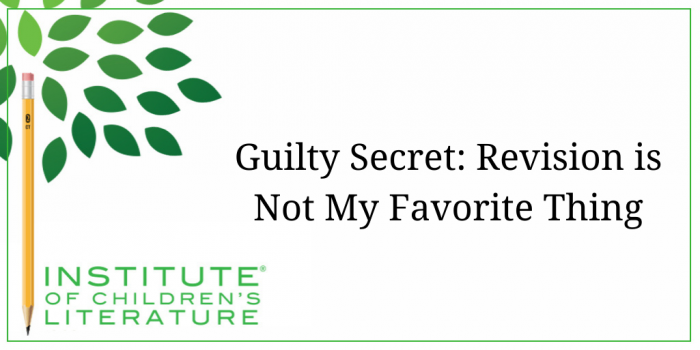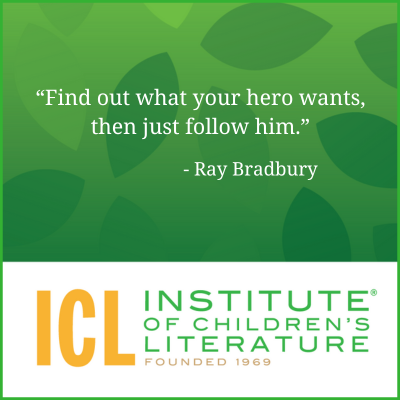1000 N. West Street #1200, Wilmington, DE 19801
© 2024 Direct Learning Systems, Inc. All rights reserved.

Some people adore revision.
They so talk excitedly about belching out their story in a rush of words and then relishing the time put into turning that rush into something a reader can love. I can admire that viewpoint and I wish I worked that way, but I don’t. I actually kind of hate revision. And so belching out a loose mass of writing with a story buried inside is a problem for me. It wads up the part of the process I find most unpleasant into one spot. And that’s a recipe for procrastination. It’s caused more than one work in progress to remain in progress for eternity—at least for me.

One of the reasons I love outlines and other pre-writing acts is because it saves me revision time later. When I preplan the plot, I’m assured that at the end of the writing process, my plot is going to work. I won’t be looking at a meandering mess of action, some purposeful and some not, and trying to figure out what to cut (or add) to make the plot work. It means I won’t have pointless dialogue. It means I won’t have pointless scenes. All of that cuts my revision time considerably. Now I know some folks are very organic writers and rejoice in just letting the words take them where they will. I respect that (mostly because I certainly couldn’t face the mounds of revision they’re going to have to do at the end) but it doesn’t work for me. So if you’re an organic writer then I suggest you learn to love revision a lot. For me, I’ll keep preplanning.
Now no matter how much I preplan, I’m going to have to do some revision. Sometimes the words that sounded so good in my head will turn out to be awkward or confusing upon later consideration. Preplanning does not make me a perfect writer. So each day I begin my writing session by reading and revising the work from the day before. This kind of revision is basically about making the prose smoother and error free. It’s also the time I take notes of the major plot points I covered in the previous writing session so I know where I’m going as I write today. This kind of revision actually primes my storytelling pump and helps me have a more successful writing time each day. And it also lessens revision needed at the end.
 Three: Revision as Procrastination
Three: Revision as ProcrastinationOften in a story, I’ll hit a spot where I’m struggling. No matter how carefully I preplan, there are those spots where it’s simply not a joy to write. But I have a very serious writing schedule. So on days when my creative self is simply refusing, I give it a break and spend the day revising instead. I’ll go back to the beginning of the work in progress and begin revising from that point, making sure everything is smooth and the plot at the beginning of the book still works with the plot later on. I’ll also sometimes spot what I’m doing that is creating the obstruction. But even if I don’t, my task-master self gives my creative self a break while still working. And since this kind of revision is actually procrastinating, it actually feels much less painful, because I love procrastinating.
Once a book or story is done, I still have to do revision. I have my revision plan that I work every time. The plan includes proofreading and typo correcting and removing overused words and continuity checks and making sure every scene and character is doing their jobs. But since I’ve been revising all along during the writing process, my prose is actually fairly smooth when I jump into my revision check list and I’m not trying to chip a sculpture out of a block of rough stone. This makes my revision passes quicker and more efficient and lets me see the light at the end of the revision tunnel. With my plan in place, I’m checking off items and moving toward a clear ending to the revision, which makes the difficult process much easier.
So that’s how I chop up (what is for me) an odious task while still making sure to get it done and get it done well. After years of perfecting this process, I can almost say “I like revision” without having to cross my fingers first.
Almost.
How about you? Are you a revision lover or hater?
With over 100 books in publication, Jan Fields writes both chapter books for children and mystery novels for adults. She’s also known for a variety of experiences teaching writing, from one session SCBWI events to lengthier Highlights Foundation workshops to these blog posts for the Institute of Children’s Literature. As a former ICL instructor, Jan enjoys equipping writers for success in whatever way she can.
1000 N. West Street #1200, Wilmington, DE 19801
© 2024 Direct Learning Systems, Inc. All rights reserved.
1000 N. West Street #1200, Wilmington, DE 19801
© 2024 Direct Learning Systems, Inc. All rights reserved.
1000 N. West Street #1200, Wilmington, DE 19801
© 2024 Direct Learning Systems, Inc. All rights reserved.
1000 N. West Street #1200, Wilmington, DE 19801
© 2024 Direct Learning Systems, Inc. All rights reserved.

1000 N. West Street #1200, Wilmington, DE 19801
© 2025 Direct Learning Systems, Inc. All rights reserved.

1000 N. West Street #1200, Wilmington, DE 19801
©2025 Direct Learning Systems, Inc. All rights reserved. Privacy Policy.
1 Comment